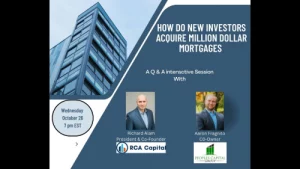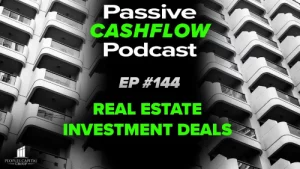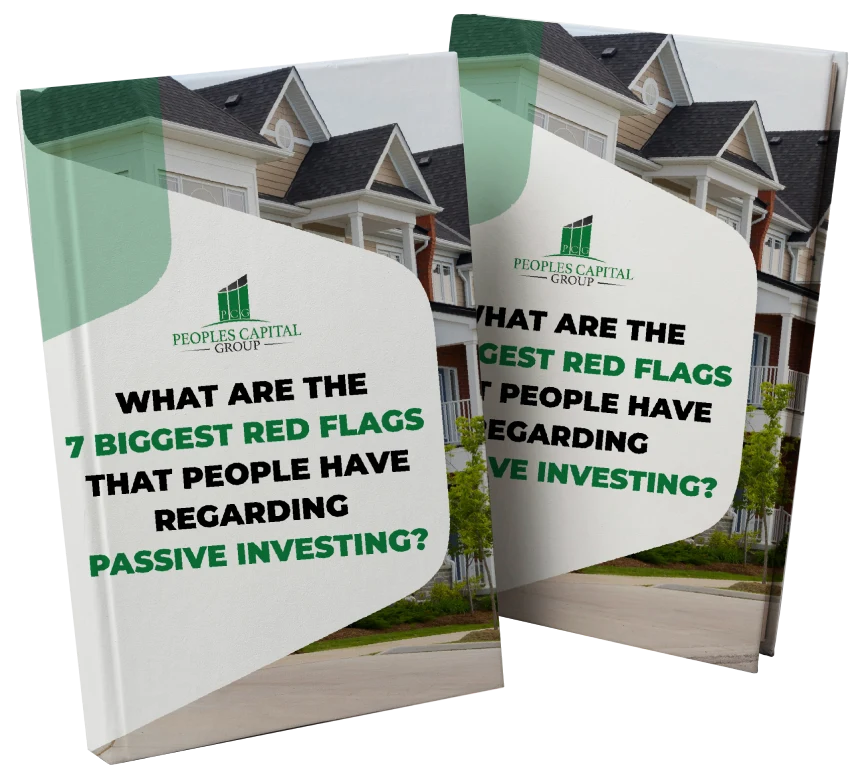A real estate syndicator is a person or company that pools capital to purchase real estate for limited partners, or passive investors. A syndicator will first need to find an investment opportunity, then present to passive investors allowing them to invest in the real estate so the investors earn passive income.

What is a Commercial Real Estate Syndicator?
Commercial real estate is considered apartment buildings 5 units or larger, mixed use property, office buildings, strip malls, marinas, most real estate that is not 4 residential units or less falls into the category of commercial real estate.
Investors and real estate syndications prefer property that is larger to allow investors to leverage their capital and own more profitable real estate.
A syndicator will often aim to start a real estate syndication company to gather a larger number of investors, buy better property and raise more capital. A real estate syndication will earn an acquisition fee when they help people invest capital into property.
Does a Syndicator Invest Their Own Capital?
A syndicator will sometimes invest their own capital into the real estate syndication as well. This is encouraging to other investors and will help the real estate syndication achieve their fundraising goals.
Depending on the deal or project, a sponsor may acquire a loan, group resources from other investments, sell securities or form an investment group to start their real estate syndication.
What Does a Syndicator Do?
A Commercial real estate syndicator will generally maintain an business strategy to find an experienced general partner(s) who duties are one or more of the following:
- manage construction
- raise capital
- find discounted property for sale
- build trust with passive investors
- create a strong investment opportunity for individual investors

What is the Investment Strategy?
Commercial Real Estate syndications focus on creating passive income for investors by finding unique investment opportunities using years of real estate experience.
Investors partake in the benefits of owning property without having to do the work so they can achieve their financial goals while maintaining a role as a passive investor.
Why is Commercial Real Estate Best?
Commercial real estate is the most popular type of real estate for a real estate syndication to own because bigger is better! Owning more units under one roof is always more profitable due to “Economies of Scale”.Capital can be safely leveraged with high value properties. Managing a larger asset creates efficiencies, allowing for more profits. The risk is generally lower overall when investing in commercial real estate.
A syndicator will generally prefer real estate that is more money as well as they will earn a larger acquisition fee. Other investors can earn a preferred return on their investment creating a deal that should be win win for all parties.
What is a Syndicator’s Role within a Multifamily Syndication?
The role of a syndicator within a multifamily real estate syndication is to find good investment opportunities, usually property for sale through private owners or pocket listings. Once under contract, bring these investment opportunities to private investors so they can invest in a high demand market or unique project.

Who Explains the Risks?
The sponsor managing the deal or project should make the negatives clear to all interested parties. Whenever reviewing an investment, the investor needs to fully understand the risk.Your money is too important to risk on the wrong deal. Investors always need to know :
- how they a protected
- how they get paid
- the investment timeline
- the property faults
- what due diligence was completed
- what is the competitive advantage is the syndicator offering
- what is the responsibility of the limited partners
- a website where they can review information about the real estate syndication and syndicator
- risks beyond loss of investment
- loan amount
- an example of deal success in the past for the syndicator
- syndicator owned properties that currently create revenue
- investors that got paid
- a past project that hit targets
- syndicator fee(s)
- limited partner portion of ownership
- partnership structure
- reporting from syndicator
How do I Determine the Right Real Estate Syndication for Me?
Before you spend money on a course or pay a fee to an attorney to review a paperwork, first determine what your investment priorities are. Investing in properties is a proven investment strategy but how much can you afford to invest?
Working with a experienced sponsor is critical to acquire a strong asset that you won’t have to manage or apply anymore resources than your hard earned capital.
A good sponsor will earn their fee so focus on working with syndicators that have a strong track record offering monthly updates without asking investors to get involved or pay too large a fee.
How do You Become a Real Estate Syndicator?
Syndicators (sponsors) have a lot of responsibility. A syndicator is involved in building and maintaining many relationships and assets.
A sponsor will be responsible in guiding people with their asset investing so they must be on point and clear eyed. Integrity, a strong credit history and a good reputation is must have for any syndicator.
What’s the First Step?
First, get involved with a building or visit an event being hosted by a real estate syndication. Save money and try investing in a syndicate first before you decide to commit your time and energy to being a sponsor. As they say, the grass is always greener on the other side.
Educate yourself on a real estate market and learn the SEC guidelines for raising capital. Connect with property managers to learn tricks of the trade all while building your relationships with wealthy individuals looking to invest in professionally managed real estate.
If you feel you are ready to be a syndicator, form your dream team of all the people required to build a successful real estate syndication. These can include:
- an SEC attorney
- a commercial real estate transaction attorney
- good realtors with pocket listings
- a reliable property management company
- wealthy people willing to invest in you
- a knowledgeable CPA and bookkeeper
- a builder and contractors
- numerous service providers for landlords
- a fundraiser
How Much do Real Estate Syndicators Make?
As the saying goes, “The sky is the limit”. Real estate syndicators can build their wealth to amazing levels and earn fees along the way. Here are several streams of profit a successful real estate syndicator would expect to earn:
- acquisition fees
- assets under management fee
- distribution of positive cash flow
- proceeds from sale or refinance of property
- disposition fees
- profit through event sales, speaking or educational packages
The main form of income for most real estate syndicators is through ownership of real estate. When a property is sold or refinanced, it can create a large windfall for a sponsor, especially if they do their job right!
How Much Taxes Does a Syndicator Pay?
The best part of about being a real estate syndicator is that if you pay yourself through the refinance of real estate and trade into larger properties over time using a 1031 exchange, you defer all capital gains tax indefinitely.
For example, if a syndicator earns an acquisition fee of $100,000, they will likely need to pay about$35,000 in income tax. However, if a syndicator earns $100,000 from the refinance of real estate, they will owe $0 in income tax and $0 in capital gains tax. This is because the real estate is not being sold nor is this cash flow or proceeds from business activities.
Why We Always Prefer to Refinance
A refinance of real estate is new debt taken on by the LLC owning the real estate. It is good debt that is normally low interest and will be paid down over time by the tenants in the property.
The IRS does not tax debt, it only taxes net revenue. Therefore, a refinance allows real estate investors to harvest equity growth without selling the building, losing their cash flow source and paying capital gains tax.
The buy, renovate, refinance strategy tends to be a better tax strategy than selling real estate.
How Much Does a Real Estate Syndicator Work?
Syndicators work a lot. People invested in the syndicator will expect performance and consistent updates. If you don’t perform, do not expect people to continue to invest in you.
Syndicators wear many hats in a day. One moment you may need to convince a multi millionaire why you are the better investment and in the next moment you may be dealing with rude tenants screaming at your management company.
A good syndicator can speak confidently in front of hundreds of people explaining their craft, but must know how to put together an incredibly in depth spreadsheet to analyze complex commercial assets in short period of time.
What’s a Day in the Life of a Syndicator?
Dealing with contractors, service providers, employees, management companies and the general public are what you may be doing in a single day as a syndicator. Sure there are established companies where the head syndicator sits behind a large desk and collects a fat check, but getting started is not easy.
Entrepreneurs and self starters will thrive but beware, this is not a get rich quick strategy. Most successful syndicators have worked many years with late nights and lost money along the way learning how to be a savvy real estate investor while protecting their prized investor capital.
There is a huge amount of risk when taking on multi million dollar loans and the buck stops with you. If the management company you hired doesn’t show up when you need them, that’s your fault. If the tenant you approved skips out on the 2nd month’s rent, that reflects on your decision making skills.
If at the end of the year you have not hit your target for investors, you better take the blame and do better or no one will invest with you in the future.
Yes That Means Writing a Check From Your Personal Account
Have equity in your home but your syndicate can’t pay the bills this month? Sit down with your spouse and let them know you’ve screwed up and need an emergency loan.
Yes, you are on the hook to make ends meet when you are the syndicator. You may not be legally inclined to use your life savings, but you better be ready to if you want to continue to be a real estate syndicator. If your corporation needs money you better find it and that means sometimes going into personal debt.
In Conclusion
Starting a real estate syndication is not for everyone. The amount of time and commitment required to become a successful syndicator is why most people find that being a limited partner and investing passively is a better fit for them.
Since real estate is such a management-intensive asset, it is best to do your homework and select the right syndication for your investment goals. Good luck!





